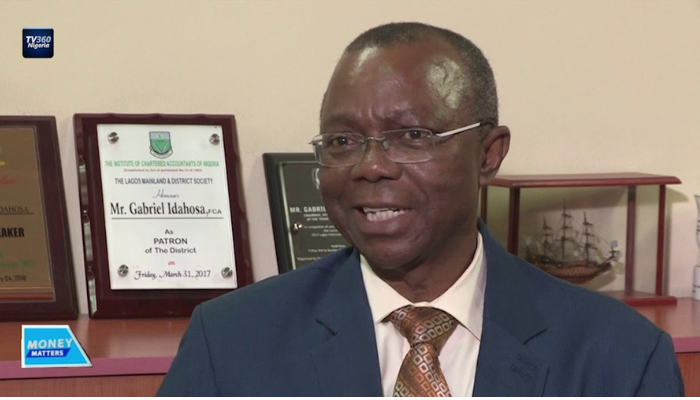The Lagos Chamber of Commerce and Industry has called on the Federal Government to shift its focus from statistical optimism to practical reforms that will restore investor confidence, strengthen the naira, and ease the cost-of-living crisis facing millions of Nigerians.
President of the LCCI, Gabriel Idahosa, made the call during the Chamber’s state-of-the-economy briefing in Lagos on Wednesday.
He said, “The government must move from statistical celebration to strategic economic transformation. Stabilising the naira must be a top priority. This requires restoring FX confidence, boosting non-oil exports, and supporting domestic production.”
While acknowledging the rebasing of Nigeria’s Gross Domestic Product and the Q1 2025 real growth of 3.13 per cent, which puts nominal GDP at N372.82tn, Idahosa warned that “behind the optimistic figures lies our reality.” He noted that high inflation, a weakening naira hovering around N1,530/$, and surging energy costs continue to deepen poverty and erode household and business income.
He said, “The conditions of many Nigerians have worsened despite the new numbers. Inflation, particularly food inflation, is unrelenting. This is alarming in a country where most household spending goes to food.”
He urged the government to urgently address food security through subsidies, storage infrastructure, and logistics upgrades. The Chamber also demanded renewed efforts to support Micro, Small and Medium-sized Enterprises and the informal sector through affordable financing and full implementation of the 2025 Nigerian Tax Reform Act.
“Job creation in agriculture, construction, and tech must be backed by aggressive skills development. Citizens need to see transparency and real implementation of policies to restore confidence,” Idahosa added.
On monetary policy, the Chamber criticised the Central Bank’s decision to retain the Monetary Policy Rate at 27.5 per cent, calling it a “depressing burden on businesses.” According to Idahosa, “Rate hikes alone will not curb inflation. The real sector, agriculture and manufacturing, must be fixed to resolve the root causes.”
Despite inflation easing to 22.22 per cent in June, food inflation rose to 21.97 per cent, up from 21.14 per cent in May. The Chamber warned that persistent food prices, high energy costs, and structural inefficiencies remain major threats.
“If the current inflation moderation is sustained, there may be room for interest rate cuts in the second half of the year. But this hinges on managing climate threats like flooding and improving farm security,” he said.
On the naira, the Chamber acknowledged a marginal appreciation to N1,529.21/$ in the official market at the end of June and attributed the stability to the CBN’s transparent policies and increased investor confidence.
However, it raised concerns about the country’s declining external reserves, which fell by $1.1bn in Q2 2025 to $37.21bn. Idahosa said the drop reflects lower oil prices and production, calling for urgent action to tackle oil theft and vandalism and expand local refining.
The LCCI also singled out Nigeria’s growing debt, which stood at N149.39tn as of March 2025, up by N27.72tn from the same period last year. It blamed the rising debt stock on new borrowings and naira depreciation, warning that it was inflating debt service costs.
“The debt trajectory is unsustainable. Government must diversify revenue, cut waste, and improve spending efficiency,” Idahosa said.
Reacting to the passage of the landmark Nigerian Tax Reform Acts, the Chamber commended the efforts to simplify taxation, reduce compliance burdens, and promote investment.
The chamber warned that successful implementation would require widespread stakeholder engagement and taxpayer education, stating, “We applaud provisions like the exemption of small businesses from multiple taxes and the introduction of a Tax Ombuds Office. But enforcement must be transparent, and reforms must build trust.”
On the fiscal front, the LCCI flagged concerns over the repeated rollover of the 2024 capital budget to the end of 2025.
“Serial rollovers corrode budget credibility,” Idahosa noted, urging the government to re-evaluate the 2025 oil price benchmark of $75 due to falling global prices.
The Chamber also responded to projections by the World Bank and IMF, which forecast Nigeria’s 2025 GDP growth at 3.6 to 4.1 per cent. While recognising that higher oil output and robust service sectors may drive growth, it warned that agriculture remains subdued due to insecurity.
Referencing the IMF’s Article IV Consultation, Idahosa reiterated that Nigeria must recalibrate its budget, tighten monetary policy, protect the vulnerable, and commit to deeper reforms.
“We support these recommendations and urge the government to sustain the current reforms, especially in infrastructure, energy, and services, to meet growth targets,” he stressed.
Meanwhile, the LCCI hailed the ‘Nigeria First Policy,’ introduced in response to rising global protectionism, as timely but warned that local production must improve for the policy to succeed.
Idahosa advised that “Government must lead by example; ministries, departments, and agencies must procure locally made goods, from vehicles to refreshments.”
He also urged the National Orientation Agency to launch a strong campaign to promote the policy’s benefits.
To ensure that Nigerian businesses benefit from the policy, the LCCI called for targeted financing, tax relief, and capacity building for SMEs.
“The Nigeria First Policy must be aligned with the national food security agenda and replicated at state levels,” urged Idahosa, who concluded his address by noting the country stood at an economic crossroads and warned that reforms without strategic execution would only deepen public frustration.
“Nigerians want results, not just reforms. It’s time to deliver,” he cautioned.















